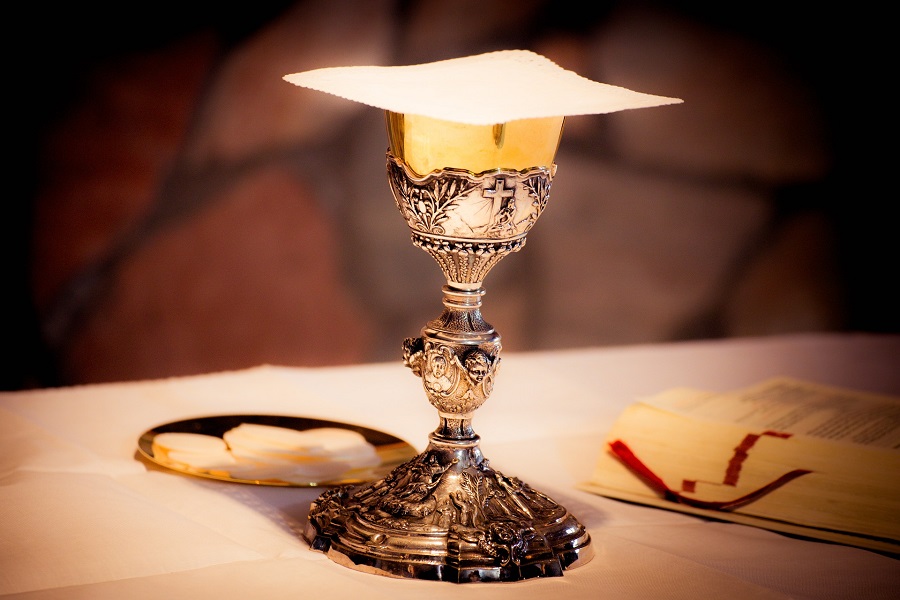
The Gift of All Gifts
06-11-2023Weekly ReflectionStanding at the crowded table in the dim candle light of the Upper Room during the Last Supper, Jesus Christ did not hand out Bibles to the Twelve Apostles and solemnly tell them, “Take this, all of you, and read it. This is my book, written for you.” Jesus gives us Himself, not a book. On today’s Feast, we commemorate God’s greatest gift to mankind, the person of Jesus Christ. God gives us His Son, and then Christ gives us Himself, body and blood, soul and divinity, under the accidents of bread and wine in the Holy Eucharist. Gift, gift-giver, and receiver meld into one in this sacrament of sacraments. In the era of the early Church, it was customary for an excess of bread to be consecrated at Mass so that the Eucharist could be carried to the sick who had been unable to attend the Holy Sacrifice. This practice led to the adoption of the pyx as the first sacred vessel for reservation of the Eucharist.
Some modern churches pay homage to these Eucharistic origins by hanging an oversized pyx on their wall to use as a tabernacle, imitating the early Church custom. Permanent reservation of the Eucharist led, over the centuries, to enthroning the Lord amidst the greatest splendor in churches. By the early medieval period, the time had long passed when the Eucharist was reserved merely to be brought to the sick. Adoration of the Blessed Sacrament, street processions, chants, confraternities, songs, flowers, and all the splendid trappings of a feast day covered this dogma in glory by the High Middle Ages, and continue to wrap it in honor today.
Saint Thomas Aquinas taught that the most necessary sacrament was Baptism but that the most excellent was the Holy Eucharist. This most excellent sacrament has been, for some, too excellent. In the Gospel of John, when Jesus tells His disciples that they must eat His body and drink His blood, many are incredulous and walk away. But Jesus does not compromise or say He was misunderstood. He lets them keep on walking. This initially hard teaching for the few was destined, over time, to be lovingly welcomed by the many.
The Old Covenant of the Old Testament was gory. In a kind of primitive liturgy, Moses had goats and sheep slaughtered on an altar and their blood gathered into buckets. He then splashed this blood over the people, sealing their acceptance of the written law. Flying droplets of animal blood splattered against people’s skin to remind them of their promise to God. No such bloody drama breaks out at Sunday Mass. We each bless our head and torso with holy water and receive a pure white host on the tongue. The New Covenant is based not on the blood of goats, bull calves, or on the ashes of a heifer. It is rooted in the generosity of the Son of God, who “offered himself as the perfect sacrifice to God through the eternal Spirit.” Christ’s Covenant with his people is established verbally and liturgically at the Last Supper and physically on the cross the following day. The consecration of the Sacred Species at Mass continues Christ’s physical presence among us, while adoration of the Blessed Sacrament suspends the consecration of the Mass, stretching it out into hours, days, months, and years. We naturally desire to leave a part of ourselves to our loved ones. We send photos, solemnly pass on a cherished memento, or give a baby a family name. Soldiers used to carry a locket holding a few strands of their wife’s or girlfriend’s hair. We need to be close, physically close, to those we love in concrete, tangible ways. Jesus desired the same, and, not being constrained by the limitations of human nature, He did the same, and more. He has left us Himself! That dogma processing down the street is a person! And that dogma behind the golden doors of the parish’s tabernacle is the same person! So bend that body low and set that heart on fire, for the Saving Victim opens wide the gate of heaven to all below. We stand as close to Christ in the Holy Eucharist as the Apostles ever did on Mount Tabor.
Lord of the Eucharist, we venerate You with heads bowed, as the old form of worship gives way to the new. With faith providing for what fails the senses, we honor the Begetter and the Begotten, loving back at what loved us first, apprentices in the school of love.
BACK TO LIST